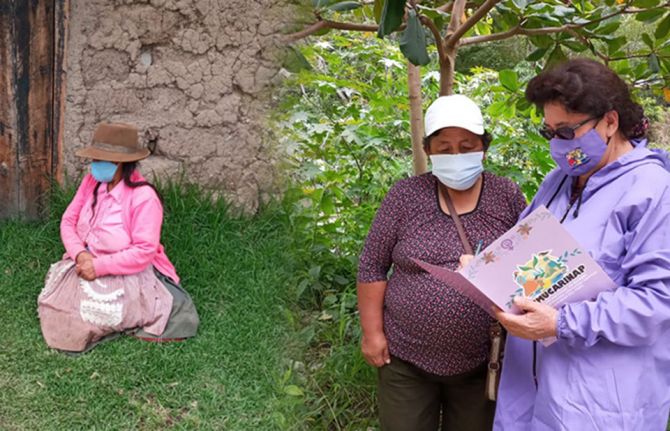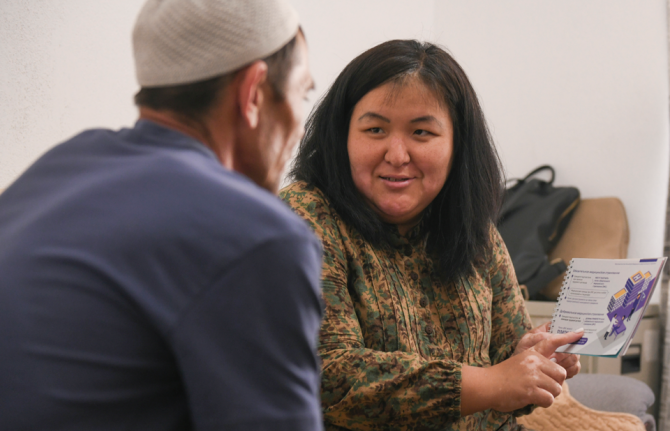

Feature Story
Community-led projects reach vulnerable populations in Latin America and the Caribbean
15 September 2021
15 September 2021 15 September 2021“We have changed our way of thinking and our attitude towards people living with HIV. In the jungle, we don’t talk about it, and every day we see more and more people living with the virus,” said Aurora Coronado, a member of the National Federation of Peasant, Artisan, Indigenous, Native and Salaried Women of Peru.
Fenmucarinap, as it is known by its acronym in Spanish, is among the 61 organizations that have received grants from UNAIDS through an initiative called Soy Clave: de las Comunidades para las Comunidades (I Am Key: from Communities to Communities) since its launch in May 2020. The funds support community-led solutions in the response to HIV during the COVID-19 pandemic. “The project allowed us to share knowledge and learn more about HIV. Now knowledge is being passed on. Now we speak from the heart to young people living with HIV and many are taking care of themselves and taking their treatment,” Ms Coronado added.
Almost 5000 kilometres away from the project in the Peruvian jungle, in the Santa Martha Acatitla Penitentiary in Mexico, another community-led initiative was also implemented in the first year of the pandemic. “We can basically say that we saved the lives of people who are generally forgotten, especially in moments like these,” said Georgina Gutiérrez, from the Mexican Movement for Positive Citizenship, whose project was implemented in the same institution in which her husband had been imprisoned for eight years. “Through this initiative, we were able to support a population that lacks basically everything, especially dignity.”
These projects are examples of how small catalytic funds can make a difference and bring a positive impact for entire communities, especially in moments of extreme vulnerability and exacerbated inequalities. Through the Soy Clave initiative, UNAIDS and its partners focus on offering support to community-led projects around three pillars: prevention of the transmission of COVID-19, continuation of the HIV response and upholding human rights and preventing stigma, discrimination and violence towards people living with or affected by HIV and COVID-19.
The Latin America and Caribbean region experiences inequalities that are both deep and widespread and includes countries that are more unequal than those in other regions with similar levels of development, according to recent reports from the Inter-American Development Bank and the Latin American and Caribbean office of the United Nations Development Programme (UNDP).
The first phase of the US$ 300 000 initiative was launched in July 2020 in response to evidence from several regional online surveys conducted by UNAIDS since the onset of the COVID-19 pandemic. Grants were initially distributed among 31 projects, 10 of which were also funded with the support of UNAIDS Cosponsors through their regional offices—the United Nations Population Fund (UNFPA) helped fund four projects, whereas the United Nations Children’s Fund (UNICEF), the World Food Programme (WFP) and UNDP funded two projects each.
Data from the 31 initiatives of the first round of grants collected up to July 2021 by the UNAIDS Regional Support Team for Latin America and the Caribbean show that more than 700 000 people in the region had already been reached through the projects’ activities. Altogether, the community-led projects have delivered more than 270 community solutions that have had a direct impact on, for example, the strengthening of health services, the training of vulnerable communities and populations, awareness-raising of key HIV and COVID-19 issues and COVID-19 prevention and mitigation.
Recently, UNAIDS launched a second tranche of funding for 30 community-led initiatives, reaching a total 61 projects in 19 countries (Argentina, Brazil, Bolivia (Plurinational State of), Chile, Colombia, Costa Rica, Dominican Republic, Ecuador, El Salvador, Guatemala, Guyana, Honduras, Mexico, Nicaragua, Panama, Paraguay, Peru, Uruguay and Venezuela (Bolivarian Republic of).
“From 40 years of experience in the HIV response, we have learned that civil society and community-led initiatives are essential to reach the most vulnerable. We were right when we decided to invest in these organizations during the COVID-19 pandemic because they have delivered results and have proven that they are crucial to the response to both pandemics,” said Alejandra Corao, Director, a.i., of the UNAIDS Regional Support Team for Latin America and the Caribbean. “I congratulate the organizations selected in 2020 and hope that the 30 selected for the second phase of funding will also have the same success in reaching the most vulnerable people in these challenging times for our region.”
The implementing phase for these newly selected projects will run until December 2021. All the initiatives were selected by a joint committee formed by the UNAIDS Regional Support Team for Latin America and the Caribbean and the regional offices of UNICEF, WFP, UNDP, UNFPA, the United Nations Educational, Scientific and Cultural Organization and the Pan American Health Organization.
More than 200 Spanish-speaking and 70 Portuguese-speaking organizations participated in virtual workshops organized by UNAIDS to guide community-led organizations in applications for the Soy Clave initiative and in the creation of projects and the definition of objectives for a US$ 5000 grant.
Impact on communities
HIV activist Marcela Alsina, who is from Honduras and who implemented a regional project with the Asociación para una Vida Mejor (APUVIMEH) and the Latin American Movement of Positive Women (MLCM+), noted that the funds allowed the organizations to carry out an online survey in eight countries and to gather data to define their strategic lines of action.
“We learned that 35% of the women surveyed in these countries suffered some type of gender-based or institutional violence during the COVID-19 pandemic,” she said.
At least 23% of all the funding was directed towards women. Funds were also distributed among projects focused on key and vulnerable populations, including indigenous people, Afro-descendant communities and people on the move.
“Thanks to this funding, our project, Hablemos Positivo (Let's Talk Positively), delivered 450 sexual and reproductive health kits and organized talks on health promotion, HIV prevention, sexually transmitted infections and COVID-19,” said Danilo Manzano, of Diálogo Diverso in Ecuador. “We also disseminated a communication campaign on social media to raise awareness about the human rights of lesbian, gay, bisexual, transgender and intersex people on the move, as well as people living with HIV.”
“It is not easy to get funding to work with women, especially women living with HIV in Latin America”, said Kattia López, from the International Community of Women Living with HIV/AIDS in Costa Rica, who developed virtual working groups with more than 60 women living in vulnerable conditions and who suffered violence from their partners during the early stages of the pandemic. “We saw that this project gives us the light to reach women that no one else reaches, and to transform their realities. We are not going to leave any of them behind. Investing in women always pays.”



